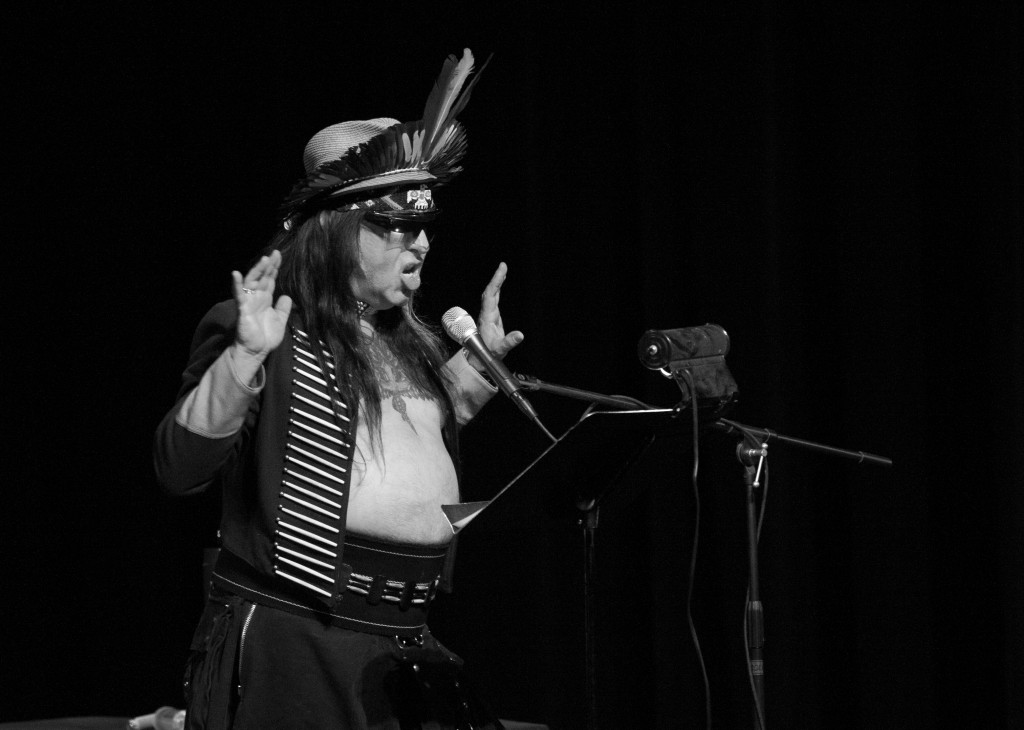“El Mad Mex” Brings Art and Activism to City College Theatre

By Audrey Garces
City College received its first taste of performance art on March 18 when Guillermo Gómez–Peña graced the Diego Rivera Theatre’s stage as “El Mad Mex,” bringing a whirlwind of provocative poetry and humor, intertwining activism and art.
“I think that he represents a large part of our community: their experiences, their hopes, and he makes it vocal,” City College drawing instructor Diane Olivier said.
Setting the Stage
Foreshadowing themes for the evening, an artist named Balitronica Gómez performed in the theatre’s lobby as the persona the Phantom Mariachi. Members of the crowd were photographed as they held a chain that was attached to a collar around her neck. She posed silently in her tight, faux leather body suit covering her face and raised up a sign which read, “Against the erasure of complex identities and eviction.”
Inside the theater, Gómez–Peña, 60, walked onstage in leather boots, sporting a feather headdress and knee-length black skirt with black pants underneath. He opted for a jacket without a shirt, revealing a giant tattoo across his chest.
His performance, titled “El Border Brujo,” used language experimentation and rhythmic spoken word, often sounding like the beat of a drum. He evoked a mixture of a political commentator and stand-up comedian, pushing the audience’s notions of sexuality, culture and race.
“I think democracy cannot thrive without the critical voice of the artist constantly testing its limits and possibilities,” Gómez–Peña said in his 2014 TED Talk.
A Global Perspective
Gómez–Peña began with warnings to those whom his performance may offend, which were welcomed by the audience with roaring laughter. His list included those with “internalized racism,” “in support of making America great again” or “prone to mansplaining and its physical counterpart, manspreading.”
“Please, if you are triggered by this list, don’t sue City College,” Gómez–Peña said as the audience erupted into more laughter and cheers.
A recurring theme in his monologues was what he explained as the sense of paranoid nationalism some Americans feel, which allows them to scapegoat immigrants to address their own irrational, yet deeply ingrained fear of culturally diversity.
In an “open letter to the ex-Governor of Arizona, cc: Donald Trump, and the other Republican presidential candidates,” Gómez–Peña pointed out contradictions within their “cultural behavior,” and poked fun at the hypocritical nature of US American cities, teams and food that are influenced by Mexican culture.
“No more piñatas for your children,” he said, receiving more laughs.
Toward the end of the night, he emphasized the importance of having compassion toward the entire world, rather than solely the United States.
“Dear contemporaries: God bless Mexico. God bless Afghanistan,” Gómez–Peña shouted while slicing his hands through the air. “God bless Iraq. God bless Pakistan,” and continued his list of countries by encouraging the audience to jump in. No one mentioned the United States.
“One of the biggest things I am taking out of this is his compassion for others. Sometimes I feel like that is really missing in the discussion in America,” Olivier said. “It’s always about us, and he’s talking about it being about others, and I thought that was powerful.”
One Less Mexican
Gómez–Peña delved into how undocumented immigrants are exploited during a Q-and-A, probing the audience with personal questions through a megaphone to parallel the experiences of Mexicans communicating with border patrol.
“It was definitely a little shake-up, but I didn’t necessarily feel offended or anything,” audience member Auguss R. Sage said. “It’s just stuff that we don’t always talk about, and I feel like there should be more dialogue around it.”
Born in Mexico City, Gómez–Peña moved to the United States when he was 23. He studied at CalArts, started the performance art group La Pocha Nostra, has countless videos on YouTube and has published 11 books.
Gómez–Peña also recalled a past experience when a journalist asked him how many “illegal aliens” are currently in the U.S.
“It all depends who you ask. An Anglo sociologist would tell you 11 million. A Chicano activist will answer none,” he said. “But if you ask a Native American elder, he may say 400 million. And technically, he is right.”
After about an hour of performing, Gómez–Peña took his final bows and the audience gave him a standing ovation before he left the stage.
“It hit home with me because I have a Chicano background,” City College student Kosette Rioja said. “I don’t think I can necessarily express myself that way, but seeing him do it was amazing.”
He had saved a moment of the night for the very end, coming back out for an encore performance to recreate a speech he once gave in Mexico City about the complexity of the Mexican government with organized crime, cartels and violence. For several heartbreaking minutes, he appeared to be speaking into the megaphone but no sound came out.
“He said a lot by not saying anything at all,” Luz Rioja, a UC Berkeley student, said.
He broke down into sobs and fell to his knees, then got up and walked offstage.
The audience gave him a final, thunderous applause.
Contact a reporter
Send an email to: Audrey Garces or tweet @AudreyGarces
